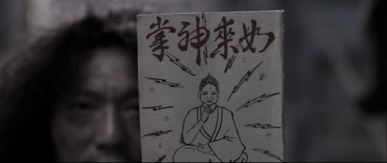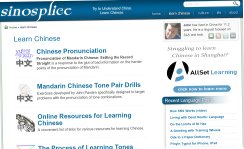If you’re studying martial arts in China whether north or South, the chances are you might also be learning the language or at least have it as one of your goals. Whether your motivation is a deeper understanding of your Shifu and the various martial arts concepts he or she is teaching you or whether it is simply to make living in China easier, learning the language makes your experience more colorful and opens greater possibilities. And yes and those possibilities also improve your chances of success with the opposite sex.
This article is specifically tailored to highlight the common mistakes that martial arts students and adventure travelers often make when attempting to learn the language.

Mistake #1: Assuming the language learning classes at the kung fu school of your choice will be enough to give you a basic understanding of Chinese
Over the past 10 years many kungfu schools in China have developed specifically to cater to international kung fu students. Many of these have divided and sub divided over the years. The result has been many schools are hard to tell apart except for their locations. The heads of these schools through their shared experiences have caught onto the fact that many of their potential students are looking for a total experience. They are not just after expert kung fu tuition from ‘Shaolin masters’ they want language learning classes, buddhism classes, calligraphy and even TCM (Traditional Chinese Medicine). So with one school offering this the rest attempt to follow suit. Promising to over deliver on value for money with these optional evening classes.
The truth is however, that the optional evening classes most schools offer are generally very basic and only meant to be introductory at best and at worst are poorly structured, and a total waste of time. For the purpose of this article I am going to concentrate on the mandarin classes.
Generally, these are taught by inexperienced translators working at the schools who often have little or no teaching experience. This makes the class itself, structure and content rather random. Another additional challenge you will face is that these classes are often open to all school new comers who have a varying degree of seriousness about learning the language. The result is that every few sessions you might be back to learning, ‘
'Ni hao'
你好
And listening to your new class mates ask questions such as, ‘how do I say you are beautiful in Chinese?’ or ‘how do I say this is too expensive!’
The solution is to not expect too much from the free language learning classes and instead to take control of your own learning. I recommend you buy structured Hanban HSK Chinese language learning books, Practical Chinese Reader. And work toward completing the HSK exams. This will help you set achievable incremental goals. HSK books generally have a text book, workbook and audio files/cd’s, dvd’s. These books start from beginner level and work up to advanced. HSK Level 1-6.
Using these books as the main foundation for your course material will give your Chinese class structure and provide the teacher with set lessons to help you complete the books.
NOTE: If you would like us to send you any of these books please let us know and we will order them and send them direct to your school so they are either ready for you on your arrival or soon after.
So the language classes at the kung fu schools might not be the best. However, they are great value for money and with the right attitude and some dedication they can still get you the basic Chinese and the foundational level you want.
 Mistake #2: Not mastering tones
Mistake #2: Not mastering tones
If you speak Chinese without proper tones you might as well be half deaf and dumb. The tones are the foundation of the language so time spent here and reviewing this will really help you get your learning off on the right track. If you don’t almost no one is going to understand you. No one except your classmates and your, teacher, the same teacher that’s used to students mangling his or her language. Once you step outside the warm cocoon of the classroom, everything changes.
But Chinese people can guess what you’re trying to say, right? Wrong.
The reason why is simple but hard to fathom for people who didn’t grow up speaking a highly tonal language — to a native speaker of Chinese, the different between tones is just as pronounced as that between consonants — perhaps even greater. Now, I’m sure you will debate time and time again with your fellow foreign friends but surely the context makes it clear! Trust me save yourself some pain, embarrassment and frustration. Master the tones early on.
Here are some articles that might help speed up the process: Master the Tones and Mandarin Tone Tricks.
In addition to this in the SMA Welcome Pack provided to students who book their training through www.StudyMartialArts.Org we’ll provide you with a Michelle Thomas Audio that will help you distinguish the tones and make you familiar with them in quite a unique way. Green Thumb Up!

Mistake #3: Not learning characters
What about characters — won’t leaping over them help you reach conversational fluency faster? Sure, in the beginning, Pinyin is easier, after all, and you’ll free up time to practice conversation. But characters are nothing if not an aid to your learning at the higher levels. They help you watch TV, get around town, and do pretty much everything you need to live in China without assistance. The other thing is that visual learners find learning characters re-enforces their existing learning.
Wouldn’t living in China be even better if you could read those old kung fu manuals. What price would you put on learning the ancient buddha palm? Like in the movie ‘kung fu hustle’?
It is true however that not everyone is interested in characters. Maybe your goal is just simple conversations for the heck of it. In that case you don’t need to learn characters. If you want to get any further, characters will help you when you want to go. And luckily for you there are lots and lots of apps, websites and free materials you can get your hands on to help you learn characters.
Here is a good app for learning how to write Chinese Characters, its called Skritter. Skritter allows you to write Japanese and Chinese characters with a mouse or a tablet and get a score and suggestions on how to improve your handwriting. And here is another app its called Memrise.
Memrise is community based learning app that uses images and science to make learning easy and fun. It does this through connecting audio, imagery, pinyin and character recognition.
Mistake #4: Not being consistent and persevering
Use all the opportunities available to you to learn. Pick a day each week where you force yourself just to use Chinese. The trick is to use the language when the opportunity presents itself. Immerse yourself in the language and the country and enjoy the experience. To do this you must be consistent and persevere. Making a learning plan with set learning goals for each week will definitely help but remember having goals is not the be all and end all.

Mistake #5: Focusing on progress over process
Having goals for learning Chinese is fine, and can take you a long way on the path to fluency. But you may end up going crazy long before you reach your destination. That’s because a realistic expectation for learning Mandarin to true fluency might be five to twenty years!
It’s easy to get discouraged when you make mistakes or don’t see rapid progress. So what can you do to stay sane?
First, accept that you are not Chinese, and even after years of hard work you’re still going to make stupid mistakes. The more the better, as we’ll talk about in a moment.
Second, enjoy the journey — make your goal using Chinese instead of mastering it. Focus on today, not where you want to be next year. That doesn’t mean abandoning long term goals or not setting them at all. It means focusing on the here and now and being happy with your current level of Chinese and using it. And you can do that by avoiding a common mistake that Chinese language learners make:
Mistake #6: Not making good Chinese friends
If you’re really going to master the language, you need to get out there. That’s because language can’t be completely built within the warm confines of a classroom. You find the missing pieces by getting exposed to real Chinese. A lot of it. Making interesting Chinese friends is one way to get this exposure. If you feel awkward speaking to your Chinese friends in Chinese, you need to make more friends or learn more Chinese, or both. When you find a friend who doesn’t mind speaking Chinese with you, see if you can get them to correct some of your mistakes. This is the advice that Tim Ferris gives best, from Why Language Classes Don’t work: “Make it your goal to screw up as often as possible in uncontrolled environments. Explicitly ask friends to correct you and reward them with thanks and praise when they catch you spouting nonsense, particularly the small understandable mistakes. I was able to pass the Certificatdo de Espanol Avanzado, the most difficult Spanish certification test in South America, in eight weeks, which is said to require near-native fluency and years of immersion. How? By following the above fixes and making more mistakes in eight weeks than most make in eight years.” – Tim Ferris Make as many mistakes as you can, and try to get people to point them out to you. It may be awkward at first, but it’s the best way to improve your speaking. But like you wouldn’t jump into the Amazon without learning how to swim, you need to learn the basics before putting yourself out there. One way to do so better is by avoiding this common mistake:
Mistake #7: Not using the best learning materials available
Most people think that having a great teacher is more important than having a great textbook. Personally, I agree with Tim Ferris and what he says in the article linked above: great textbooks + an average teacher > average textbooks + an great teacher. Whether or not you take formal language classes, the best learning materials will help you learn Chinese better.
Here are three sources I highly recommend:
1. Chinesepod.com — Their podcasts and other audio aides make this the best choice if you can’t attend real classes or get much time with a good tutor / language exchange partner.
2. Integrated Chinese (Princeton University Press)– This is the most thorough textbook introduction to Chinese I know of. If you learn everything in the first two year’s worths of books, you’ll have succeeded in building a good foundation for later learning.
3. Fluentu is a website with the best Mandarin Chinese video content. It’s fun, timely, and ideal for Chinese learners. It has Chinese movie trailers, Chinese music videos, Commercials, and Business Chinese videos. No matter what your interest or level of fluency, we’ve got what you’re looking for.

Mistake #8: Settling for poor classes
A bad class can sometimes be worse than no class at all — spending time and energy on average classes and with teachers who force feed you the same lessons or that have no imagination or class structure is not something you want to do. So take control of your learning.
The quality of the textbooks — Don’t settle for poor texts use New Practical Chinese Reader to being with.
The size of classes — For the most part will be small. The problem is the numbers are likely to fluctuate throughout the year during peak and quiet times at the school
The levels of classes — Most schools will have only one level it therefore will be up to you to put a case for adding extra levels. The most likely solution will be that you recommend the school has 1 level for beginners and new arrivals and another for students serious about learning Chinese.
If your teachers have experience teaching foreigners — part of the reason these classes can be so frustrating is that its likely your teacher will be totally clueless about teaching foreigners Chinese — by forcing the structure of a text and workbook you can limit this. Finally, don’t make this mistake as you will need it:
Mistake #9: Not using kickass tools for learning Chinese
There’re many tools for learning Chinese online. But these are some of the very best:
1. Google’s Character writing software There’s no better character input system than Google’s Pinyin input system. It reponds fast to your typing, guesses what characters you want incredibly well, and allows you to type out strings as long as you want. All that means a really convenient way of typing Chinese.
2. Chinese Pera-kun Have you ever wished you could hover your mouse over a character or group of characters and see its pinyin and meaning instantly? Well, a plugin for Firefox, and google chrome Chinese Pera-kun, can help you do this. It’s not perfect but it comes close.
3. Anki
 This fantastic piece of SRS software”) lets you keep track of everything you’re learning and study it efficiently. If you’re starting out learning Mandarin (or any language), I’d strongly recommend using Anki from the beginning. If you’re already some way into the language, start creating flashcards as soon as possible. Anki’s cool because it’s fairly easy to get up and running, but the more you use it the more you come to realise how deep its features and capabilities go. It can’t do everything for you, but it can make the time you put in much more effective. If you use nothing else from this list, use Anki.
This fantastic piece of SRS software”) lets you keep track of everything you’re learning and study it efficiently. If you’re starting out learning Mandarin (or any language), I’d strongly recommend using Anki from the beginning. If you’re already some way into the language, start creating flashcards as soon as possible. Anki’s cool because it’s fairly easy to get up and running, but the more you use it the more you come to realise how deep its features and capabilities go. It can’t do everything for you, but it can make the time you put in much more effective. If you use nothing else from this list, use Anki.
4. Sinosplice  John Pasden’s blog Sinosplice has a collection of very clear, accurate guides for learning Mandarin, particularly for the early stages. You can save yourself a lot of time by reading these and getting a few things right from the beginning (particularly tones and pronunciation in general).
John Pasden’s blog Sinosplice has a collection of very clear, accurate guides for learning Mandarin, particularly for the early stages. You can save yourself a lot of time by reading these and getting a few things right from the beginning (particularly tones and pronunciation in general).
5. MDBG & Pleco  A good quality free dictionary had to make it on to this list somewhere, and I find MDBG to be the best Chinese dictionary. It’s very fast and reliably online, and it’s also the result of an admirable community project to build a free and open dictionary. I would have put nciku here, but I find it’s either very slow or inaccessible, and when it actually does load, the interface is a overwhelmed by advertising. It has great content but really is hampered by these issues. Pleco is a great free app. It also supports the iPad, while many other iPhone dictionaries don’t. Pleco has an integrated dictionary / document reader / flashcard system with fullscreen handwriting input and live OCR.
A good quality free dictionary had to make it on to this list somewhere, and I find MDBG to be the best Chinese dictionary. It’s very fast and reliably online, and it’s also the result of an admirable community project to build a free and open dictionary. I would have put nciku here, but I find it’s either very slow or inaccessible, and when it actually does load, the interface is a overwhelmed by advertising. It has great content but really is hampered by these issues. Pleco is a great free app. It also supports the iPad, while many other iPhone dictionaries don’t. Pleco has an integrated dictionary / document reader / flashcard system with fullscreen handwriting input and live OCR.
6. Tatoeba  Dictionaries are useful for quick checks on words, particularly from the target language into your own. But experienced language learners know that to accurately grasp the meaning of a word you need to see it in action. For this you need example sentences, and Tatoeba is quickly becoming the best resource for this. It’s already got a huge database of examples sentences, and more are being added every hour. The thing that makes Tatoeba stand out though is that it’s more than a 1 – 1 list of translations; it’s a web of translations. It’s also a free, community-based project (you might have realised by now that I really like free, community-based projects). This means that if there’s something you don’t know how to express in Mandarin, you can just add it in English and wait for someone to come along and translate it.
Dictionaries are useful for quick checks on words, particularly from the target language into your own. But experienced language learners know that to accurately grasp the meaning of a word you need to see it in action. For this you need example sentences, and Tatoeba is quickly becoming the best resource for this. It’s already got a huge database of examples sentences, and more are being added every hour. The thing that makes Tatoeba stand out though is that it’s more than a 1 – 1 list of translations; it’s a web of translations. It’s also a free, community-based project (you might have realised by now that I really like free, community-based projects). This means that if there’s something you don’t know how to express in Mandarin, you can just add it in English and wait for someone to come along and translate it.

So there you have. Watch out for the mistakes and enjoy your learning. For further information on the best places to learn Chinese, visit StudyMartialArts.Org
 What is the Confucius Institute?
What is the Confucius Institute?














